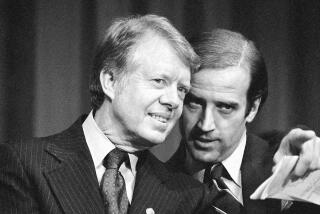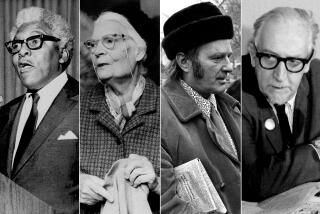A Patrician Who Lived to Serve
- Share via
Henry Cabot Lodge, who died last Wednesday at 82, offers a good illustration of the way families and history are engaged. His grandfather, Henry Cabot Sr., successfully led the bitter Senate fight against American membership in the League of Nations. But the younger Lodge served as U.S. ambassador to the United Nations in the flood tide of American leadership during the 1950s.
“The ideal of a provincial nation has given way to the realization that we have become the world’s greatest power,” he once said. “World War II first taught us the value of collective security.” Of course, World War I ought to have taught us that lesson, but the lesson didn’t take, and Woodrow Wilson wasn’t really the man to make it stick.
But that’s another matter. The life of Henry Cabot Lodge offers an interesting paradigm of our nation’s rise to power. As obituary writers have been careful to note, Lodge was an aristocrat--he even looked the part--and not just any sort of aristocrat, but a Boston Brahmin. Yet it has been Boston’s misfortune over the years to watch American history largely pass it by: The intellectual cradle of the Republic, the capital of the abolitionist movement, has slowly settled into a kind of provincial, and to some degree cultural, isolation.
George Santayana recognized this 80 years ago when he reminded his colleagues on the Harvard faculty: “The smoke of trade and battle/Cannot quite be banished hence,/And the air-line to Seattle/Whizzes just behind the fence. “
Lodge might have retreated some genteel distance from the dust and roar of public life, but he did not. Indeed, he waded into it, as a newspaperman, state legislator, three-term U.S. Senator, soldier, diplomat and vice-presidential candidate. He sacrificed his Senate seat once to fight gallantly in World War II, and again in 1952 to put Dwight D. Eisenhower in the White House.
This is, perhaps, what is meant by noblesse oblige : The precept that puts civic responsibility before personal reward. Lodge’s private satisfactions were his public duties. He welcomed his country’s new status in the world.
He was not so much an architect of American power, however, as its instrument, and it is not for nothing that he never held an administrative post of any consequence. Of course, this is the customary lot of the patrician in a democracy: born to serve but not necessarily to lead. The sturdy, virtuous Lodge--sleek, commanding, articulate--was the ideal representative of those principles that we like to think govern our national life. His heredity was his calling card, but it was also his greatest asset. In America an aristocrat can be a good soldier, too.
To be sure, such discipline has its liabilities, and the dual careers of Lodge and John F. Kennedy constitute a mini-drama of American politics. It was Kennedy, the Boston Irish Catholic, who unseated Lodge from the Senate in 1952; and it was Kennedy who defeated Lodge’s running mate, Richard M. Nixon, for the presidency in 1960.
Yet it was also Kennedy who turned to Lodge at that pivotal moment in 1963 when the United States committed itself to the defense of South Vietnam. And it was Kennedy’s Democratic successor, Lyndon B. Johnson, who used Lodge at a later, more critical, stage of American involvement.
I say “used” advisedly. Lodge’s account of the conflict in 1966 between his secret diplomatic efforts for negotiation and the intensified bombing of North Vietnam make lamentable reading. Were those efforts uncoordinated, or did Johnson misuse the services of a distinguished citizen? It is difficult to say. It is reasonable to suppose, however, that if Lodge’s instincts had governed Johnson’s actions, the Vietnam War might have had a very different (and far happier) ending.
For that matter, the consensus that once governed American foreign policy might be in better repair than it is today. Lodge was part of that consensus, and served it faithfully, long after it had ceased to earn his allegiance.
He was a relic in the sense that the tradition he represented does not dominate American public life, nor has it for some time. The elite from which he sprang is an elite in name only, and our historic sources of national leadership--whether in commerce, education, the clergy, press or politics--remain scattered and uncertain. Santayana had this in mind when he saw the “air-line” to Seattle. Leaders aren’t always sure what they want, or what the country needs, and those who serve, like Lodge, can only stand and wait.
Clearly, it was idealism as much as tradition that pushed Lodge into a life of public service, and in his old age he could look back with satisfaction on many accomplishments. But disappointed idealism can turn to bitterness, and there is in his career an element of promise unfulfilled, potential not fully realized. It is a measure of Lodge’s character that such feelings never interfered with his sense of where his duty lay, and his determination to do it.
More to Read
The biggest entertainment stories
Get our big stories about Hollywood, film, television, music, arts, culture and more right in your inbox as soon as they publish.
You may occasionally receive promotional content from the Los Angeles Times.










